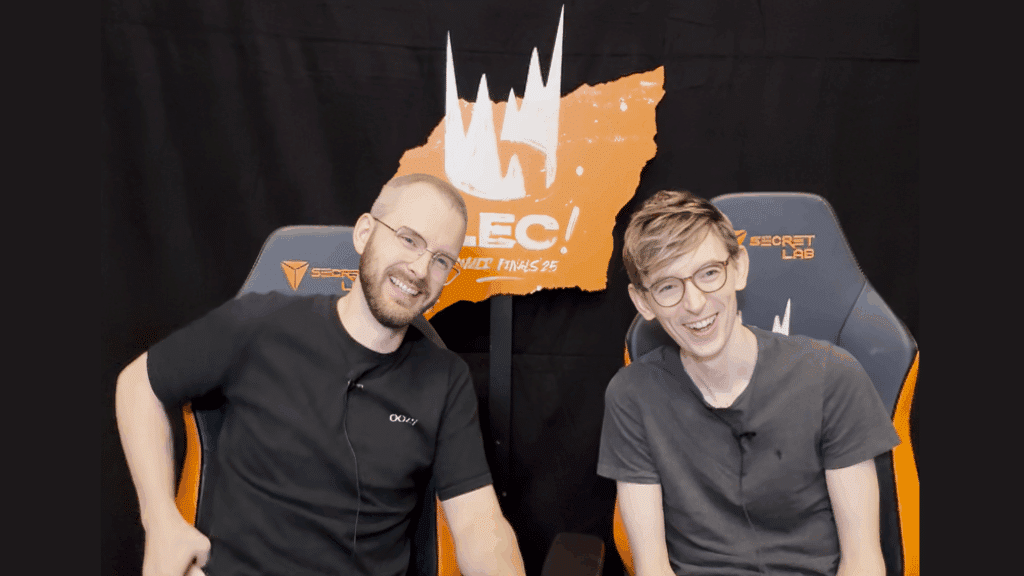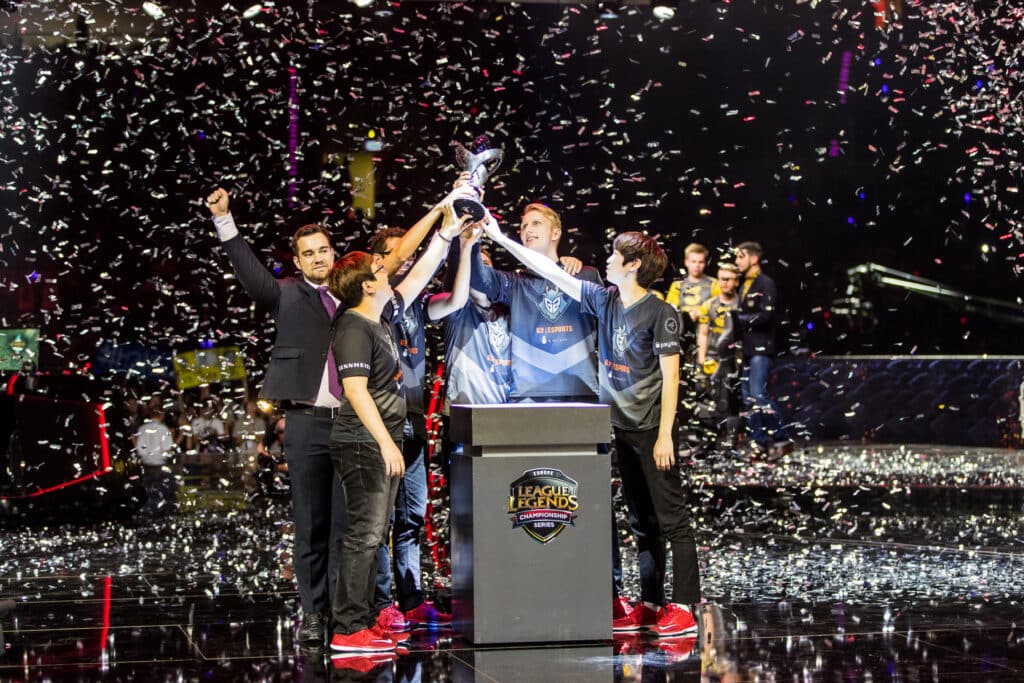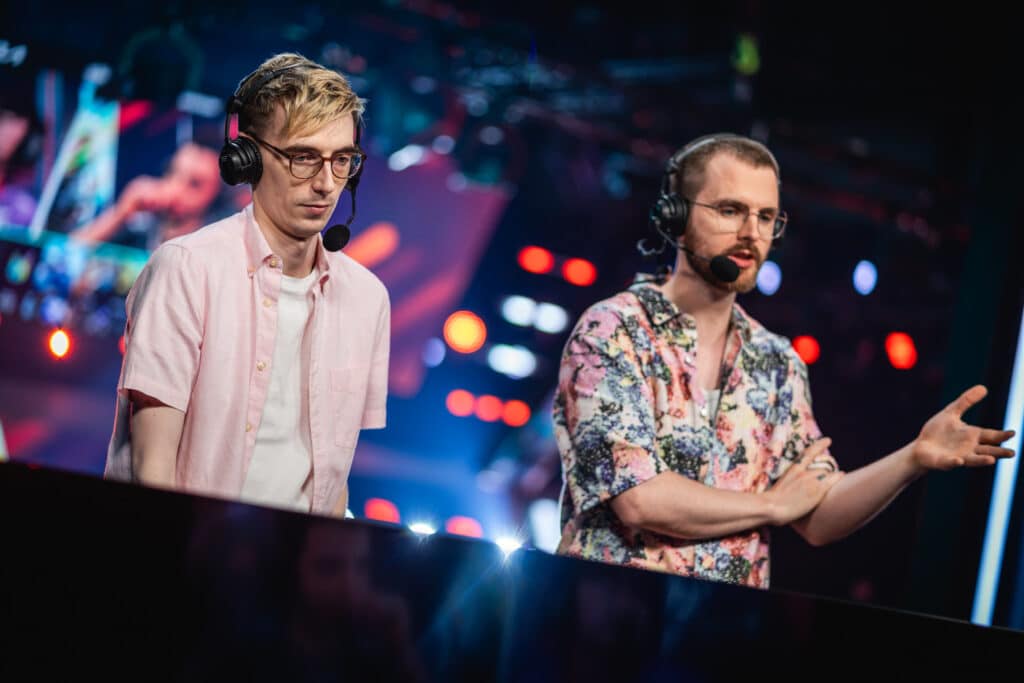
For nearly a decade, the League of Legends EMEA Championship (LEC) has stood as one of esports’ most recognisable and character-driven broadcasts.
Behind the screens lies a production team that ensures every moment feels larger than life. Yet, it’s the casters who turn those moments into stories. Their voices shape how fans experience every play, every upset and every defining moment of League of Legends esports.
Among those voices, Andrew ‘Vedius’ Day and Daniel Drakos have become emblematic of the LEC’s signature blend of depth and personality. Since joining the broadcast in 2016, they’ve done more than call the action. Through skits, musical performances and a self-aware sense of humour, the duo helped transform the LEC into a broadcast known as much for its creativity as for its competition.
In an interview with Esports Insider, Drakos and Vedius discussed what it means to be a caster. How they approach storytelling, manage fan expectations and maintain authenticity while performing at some of the biggest stages in esports.
Changing LEC Storytelling
The LEC recently celebrated its tenth Summer Final, and over the years, shifting rosters, new organisations and balance changes have repeatedly reshaped the competitive landscape. Through it all, casters like Drakos and Vedius have had to adapt their storytelling to match the ever-changing rhythm of European League of Legends.
When the duo joined the broadcast team, the league was in a state of flux. Fnatic, the region’s long-standing powerhouse, had begun to falter after years of dominance, and the stage was set for a new chapter in Europe’s competitive history.
“We came in kind of right as Fnatic collapsed in 2016,” Drakos recalled. “It wasn’t immediately clear to people who was going to rise up.”
However, it soon became clear that the crown would be passed to G2 Esports — a team that won both that year’s EU LCS Spring and Summer splits. Ultimately, G2 would go on to define the region’s next era.
That transition shaped much of the decade that followed. “The sad thing about our league,” said Vedius, “is it’s just been very centred around G2.” It’s important to note that his comment wasn’t one of criticism, but rather of creative frustration.

For storytellers, having a single dominant team means fewer narrative branches to explore. “I’ve always been envious of how the LPL has had multiple different champions,” Vedius continued. “Dominance brings recognition, but variety creates richer stories and a more diverse fanbase.”
Drakos agreed and acknowledged that defeating G2 became the baseline for every story — a team that hunts every narrative.
“You would love to say that when BDS beats MAD Lions [now KOI] or something like that, they’re the front runners,” he said. “But there’s always G2. It got to the point where it’s annoying,” Drakos admitted. “Because we know people get tired of hearing it.”
Ironically, just a few hours after the interview, G2 would go on to claim its 17th domestic title.
Even so, both casters believe the competitive landscape is broadening again. The 2025 season, Drakos said, offered a glimpse of renewed parity at the top. Even with G2 still winning the LEC Summer Split and going to League of Legends Worlds 2025, the caster is “much more optimistic” that next year the LEC rankings will be shaken up for its top teams.
Drakos acknowledged that the league’s lower half was still “a hot mess,” but the overall field reminded him of the balanced years of 2021–2022, when MAD Lions, Rogue, Fnatic, and G2 all shared the spotlight.
Misconceptions of Casting Esports
While storytelling is central to casting, both Vedius and Drakos stated that their role is often misunderstood. Many fans, for instance, assume casters show favouritism because of certain calls before or during the matches they comment on.
“The number one thing that always gets me upset is bias,” said Drakos. “I think it’s really rare that a caster ever carries any more than a small amount of unconscious bias.”
Vedius agreed, but added nuance as every caster, he said, inevitably has regional pride. “I have EU bias, but I don’t shy away from that at international competition,” he said. “I do want EU teams to win.”
That said, professionalism and objectivity always come first. As Drakos explained with a laugh, even in a matchup like G2 versus Gen.G — when it’s clear “they’re set up to get blasted” — he makes sure that personal excitement doesn’t slip into the broadcast. No matter how much he might be rooting for European teams off-camera, once the cast begins, accuracy and respect for both sides take priority.
Another misconception, Vedius highlighted, is that LEC casters pay only attention to their own league, when in reality the international broadcast community is deeply collaborative. “Because I have such a great working relationship with [other casters], I make a deliberate effort to communicate, talk to them and understand what are some of the most important stories,” he said. “At the end of the day, what we care about is that the pros are best represented.”
Vedius said that accuracy and respect are central to their approach. The goal is to represent players faithfully and keep them “at the forefront of everything.”
Casters, in his view, are there to highlight the competition — not themselves.
Are Casters Entertainers or Educators?

Beyond preparation and storytelling, one of the questions that often defines a caster’s philosophy is whether they believe their role is to inform or to entertain.
On live broadcasts, casters need to balance emotion with clarity, keeping fans engaged without losing sight of the game itself. It’s a constant internal negotiation between performance and explanation, one that both Drakos and Vedius approach from slightly different angles due to the nature of their respective roles.
For Drakos, the answer starts with audience connection. “Your job, first and foremost, is to be an entertainer,” he said. “But the show isn’t about you — it’s about the game, the competition, and the story of these players.”
In his view, the competition already provides all the material a caster needs, from the story itself to the possible angles from which it could be explored. “If you are not entertaining while you’re telling the story of Faker,” he added, “you’re messing up — because that story is insanely entertaining.”
On the other hand, Vedius has and needs to approach his job through different lenses. “As a colour caster, my responsibility is to inform the viewer of what’s happening,” he said.
“As long as you, as a viewer, understood what just happened, then I’ve done my job.” However, he underlines the distinction between educating and teaching. Casters don’t need to break down every mechanic, but they should ensure the audience understands the context and significance of each play.
Even with those differences, both agree that the best balance is a combination of showmanship, expertise and empathy, with the goal of making every moment feel significant, regardless of the viewer’s familiarity with the game.
Comparing League of Legends to other esports, Drakos noted that, unlike FPS games — such as VALORANT — League’s complexity requires casters to provide context and guide the audience through pivotal moments. It’s about ensuring that every match, no matter how technical, feels meaningful and engaging even for newcomers.
“We don’t get asked a lot about the philosophy of casting,” Drakos continued. “But when we do, it’s clear that both of us see our work as something deeper than commentary. It’s storytelling in its most immediate form — live, unscripted, and shared.”
Whether it’s a veteran’s long-awaited redemption, an underdog’s breakthrough, or the intensity of a grand final, the casters’ goal is to make every moment matter.
After nearly a decade together on the LEC stage, Drakos and Vedius have watched the league evolve from predictable rivalries into a more emotionally rich and competitive ecosystem. Yet the ways they will continue to shape League of Legends’ esports narrative will continue to evolve.
The post “The show isn’t about you,” Drakos and Vedius on the philosophy of esports casting appeared first on Esports Insider.






